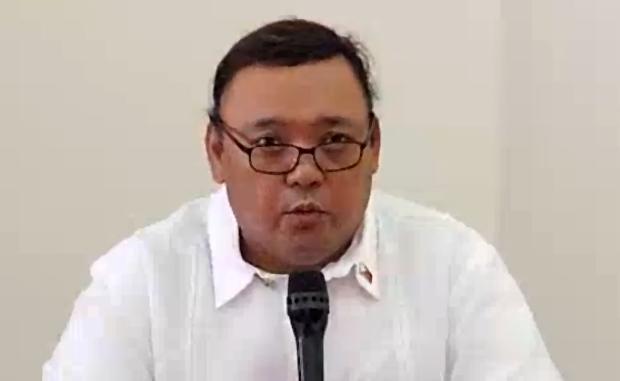
Presidential spokesperson Harry Roque conducts a press conference in Zamboanga City on Saturday, Dec. 2, 2017. (Photo from an RTVM video)
Published: 7:13 p.m., Dec. 2, 2017 | Updated: 11:23 p.m., Dec. 2, 2017
ZAMBOANGA CITY—Because the threat posed by Islamic State-inspired terror groups still hangs like the sword of Damocles over Mindanao, President Rodrigo Duterte is relying on the word of the military to help him decide whether to extend or lift martial law on the island.
Presidential spokesperson Harry Roque on Saturday said Mr. Duterte was only waiting for the recommendation of the Armed Forces of the Philippines so he could make a decision as early as next week.
“I have had prior consultations with the AFP and the recommendation will be submitted (to Malacañang) next week,” Roque told reporters in Zamboanga City.
He said the President would base his decision on the military’s take on the situation, particularly in Marawi City, which was liberated from Maute and Abu Sayaff terrorists in October, and nearby towns and provinces.
“The President will make a decision next week or the week after because Congress will go on recess on the 15th (of December),” Roque said. “And as you know we cannot have an extension of martial law without the consent of Congress.”
A military commander, who spoke to the Inquirer on condition of anonymity, said he and fellow ranking officers in Mindanao backed the extension as it would help them quell rising terror threats in the region.
“It is really up to our [superiors] if they will push for an extension,” said the officer. “Many military commanders on the ground are in favor of it.”
He said extending martial law would help hasten the rebuilding of Marawi “as the military has full control of the area.”
Another officer, Col. Romeo Brawner Jr., deputy commander of Joint Task Group Ranao, said a “higher office” would make the recommendation to the President.
“As far as TF Ranao is concerned, we do not make one,” he told the Inquirer by phone.
Brawner, however, said he would support the extension of martial law.
“I support it because it’s already working in Marawi. It will be to the advantage of residents because they already feel safe. We have talked to them and they told us that they would feel less safe without martial law.”
Task Force Bangon Marawi chair Eduardo del Rosario also backed continued military rule in Mindanao.
“I would like martial law to continue,” said Del Rosario, former commander of the Western Mindanao Command who now heads the Housing and Urban Development Coordinating Council.
“As [task force] chairperson, my main concern is the security of the whole rehabilitation effort,” he added during a press briefing in Malacañang last Wednesday.
Roque said the military’s recommendation was crucial despite the fact that Marawi had been cleared of terrorists.
“To me, let the AFP decide because they are on the ground,” he said.
Presidential Communications Secretary Martin Andanar said “most, if not the majority” of ordinary people in Mindanao preferred martial law’s second extension.
Andanar said many residents were still worried about peace and order in Mindanao, where martial law remains in effect until Dec. 31.
“If you will, as the ordinary people in Mindanao, I can bet that for most, if not the majority, martial law is OK for the improvement of trade,” Andanar said over state-run Radyo Pilipinas.
Andanar, who said he is from Cagayan de Oro City and Surigao de Sur province, also preferred the extension of martial law.
“It’s because you really can’t say what will happen,” he said.
Certain groups, however, insist that the threat has passed and are calling on the President to lift martial law.
In Cagayan de Oro City, Drieza Lininding of the Moro Consensus Group said the lifting of martial law, specifically in Marawi, will hasten the return of affected residents to their homes.
“Martial law was the reason why many civilians fled Marawi in the early days aside from airstrikes, and it is still the reason why many (people), even in cleared areas, are afraid to return. There will be no true homecoming unless martial law is lifted,” Lininding said.
He said martial rule has “deprived many of us [of the chance] to visit our homes or what remains of it in the MBA [main battle area], while we see VIP and powerful persons being toured around the area. Our [homes have become] a tourist spot for VIP of influential people, including celebrities.”
Lininding also blamed the many cases of abuse allegedly suffered by civilians on martial law.
In its postinvestigation report, the nongovernment organization Kalinaw Mindanao said it documented more than 300 cases of human rights violations allegedly perpetrated by soldiers in Marawi at the height of the conflict and even after Mr. Duterte declared the city liberated from the extremists.
Marawi Bishop Edwin dela Peña said he was against the imposition of martial law on the island from the start.
“I also did not favor the extension of martial law and was vocal about it,” Dela Peña said. —With a report from Tito Fiel /atm /pdi